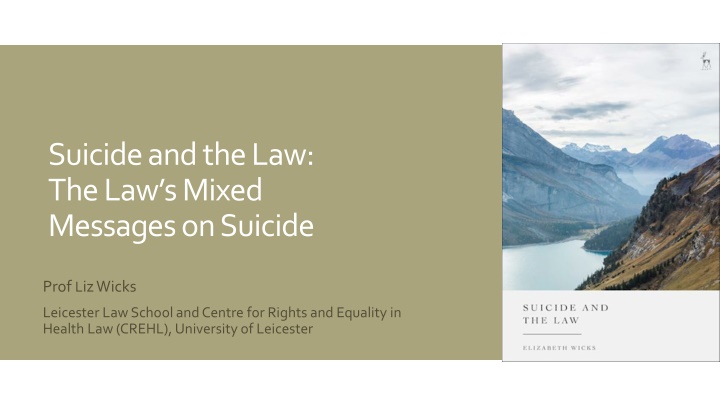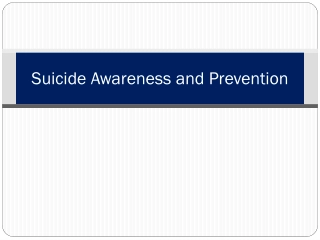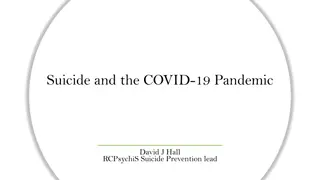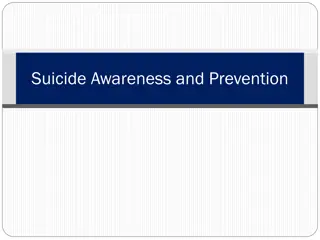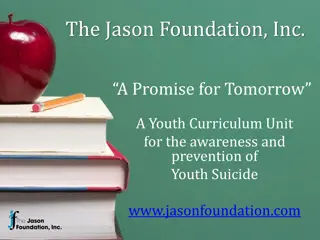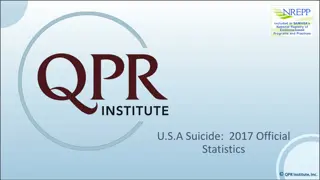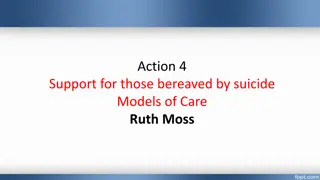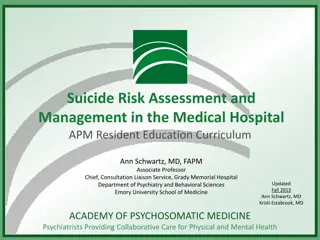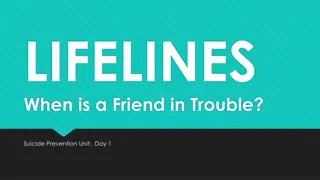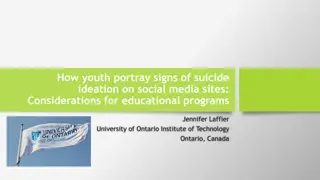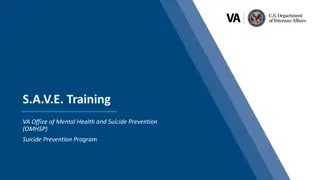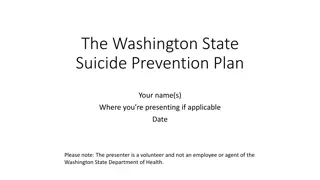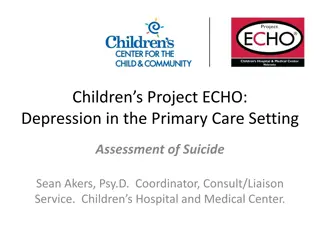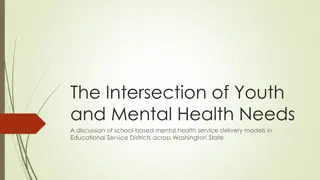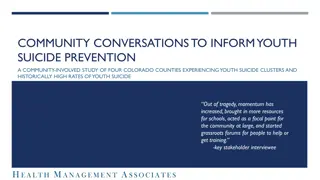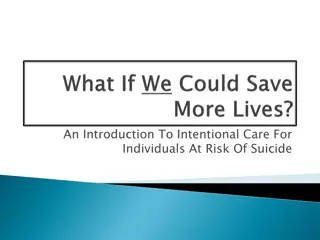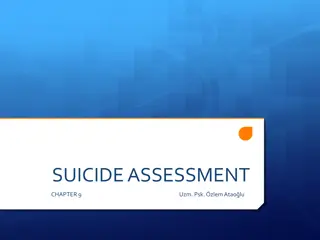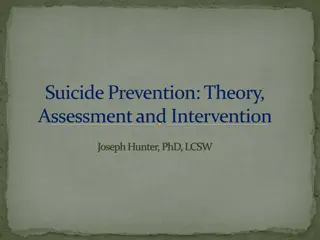The Complex Relationship Between Suicide and the Law
The history of suicide laws, from harsh punishments to prevention measures. Explore current laws on assisted suicide, mental health, and human rights. Reflect on whether the law sends mixed messages on suicide and consider recommendations for legal reform.
Download Presentation

Please find below an Image/Link to download the presentation.
The content on the website is provided AS IS for your information and personal use only. It may not be sold, licensed, or shared on other websites without obtaining consent from the author.If you encounter any issues during the download, it is possible that the publisher has removed the file from their server.
You are allowed to download the files provided on this website for personal or commercial use, subject to the condition that they are used lawfully. All files are the property of their respective owners.
The content on the website is provided AS IS for your information and personal use only. It may not be sold, licensed, or shared on other websites without obtaining consent from the author.
E N D
Presentation Transcript
Suicide and the Law: The Law s Mixed Messages on Suicide Prof Liz Wicks Leicester Law School and Centre for Rights and Equality in Health Law (CREHL), University of Leicester
Brief history of laws involvement with the issue of suicide including decriminalisationin 1961 Overview of current laws relevant to suicide including: criminal offence of assisted suicide; mental health and mental capacity laws authorising detention and treatment; human rights laws including the rights to life and autonomy Structure of today s talk Reflections on whether the law currently sends mixed messages on suicide, and suggestions for interpreting the current legal framework, and recommendations for legal reform
Criminal prohibition of suicide felode se (felony of self) Harsh punishments: Desecration of body: their bodies were interred profanely, with a macabre ceremony prescribed by popular custom. The night following the inquest, officials of the parish, the church wardens and their helpers, carried the corpse to a crossroads and threw it naked into a pit. A wooden stake was hammered through the body, pinioning it in the grave, and the hole was filled in. (MacDonald & Murphy, Sleepless Souls: Suicide in Early Modern England) Restrictions on burial and inheritance rules Imprisonment/hard labourfor failed attempts at suicide The History of the Law s Relationship with Suicide: Greater tolerance: C18th -increased use of the non compos mentis verdict by coroner s juries in order to avoid the negative consequences of a felony verdict C19th -legislative removal of the legal penalties relating to burial and forfeiture
Evolution of laws role: from punishment to prevention Mental Health Act 1959 providing alternative civil detention powers Decriminalisation of Suicide: Suicide Act 1961 Suicide Act 1961, Section 1: The rule of law whereby it is a crime for a person to commit suicide is hereby abrogated. But very little parliamentary discussion of this so no reflection on whether all suicides should still be prevented Is a rational suicide possible...? Meaning/label of suicide
Criminal law absolute offence of assisting or encouraging suicide Current law relevant to suicide: Mental health laws Mental capacity laws Human rights laws
Section 2 of the Suicide Act 1961 declared that it is an offence to aid, abet, counsel or procure the suicide of another, or attempt by another to perform suicide. Criminal Law: the offence of assisted suicide Offence encompasses a very wide range of culpability In terms of gravity it can vary from the borders of cold blooded murder down to the shadowy area of mercy killing or common humanity. (R v Hough, Lord Lane CJ) Suicide is lawful but assisting in the performance of this lawful activity is not...
Wording of offence is modernised by means of the replacement of the old-fashioned language of aiding, abetting, counselling or procuring with the more modern terms of encouraging or assisting Modernising the offence: Coroners and Justice Act 2009 New single offence applies where a person does an act which is capable of encouraging or assisting another person to perform suicide or attempt to do so, and intends his act to so encourage or assist (regardless of whether it actuallyencourages or assists) Distinction between encouraging and assisting?
Dianne Pretty case: no right to die protected within European Convention on Human Rights, so UK s absolute prohibition of assisted suicide does not violate it Assisted Suicide offence and its relevance to the assisted dying debate Debbie Purdy case: need for offence-specific prosecutorial guidance as to when it is in public interest to prosecute (leading to widescale tolerance?) Tony Nicklinson: Majority of Supreme Court declines to issue a formal declaration that the offence is incompatible with Article 8 (although many judges do hint that it is?)
Prosecution is now extremely unlikely to follow an assisted suicide in circumstances where the victim has reached a voluntary, clear, settled and informed decision to commit suicide, the suspect was wholly motivated by compassion, sought to dissuade the victim from suicide, offered only minor and reluctant encouragement or assistance, and subsequently reported the victim's suicide to the police . DPP guidance on when it is in the public interest to prosecute assisted suicide BUT certain activities may still run the risk of prosecution, such as: encouraging or assisting the death of a person under 18 or lacking mental capacity; pressuring a person to end their life; encouraging or assisting more than one person to end their lives; having a motive other than compassion for providing the encouragement or assistance. Health care professionals should also be aware of the heightened risk of prosecution if they assist or encourage the death of a patient with whom they are in a relationship of care such that it may raise concern about the exercise of inappropriate influence over the person whose death is assisted.
Suicide risk is commonly associated with mental illness (eg affective disorders and schizophrenia) and thus fall squarely into the category of mental disorder underthe Mental HealthAct. Thus for the huge majority of persons at risk of suicide, legal powers exist under the MHAto authorise compulsoryadmission to hospital: Section 2 admission for assessment Section 4 emergency admission Section 5 compulsory detention for in-patients Section 136 police power of removal to a place of safety Section 3 longer term admission for treatment Suicide and the Mental Health Laws All hinge on existence of mental disorder (and interests of own health or safety) but do not require lack of mental capacity
Compulsory powers of detention and treatment under the MHA do not require a lack of mental capacity Mental Capacity Act 2005 also presents opportunities for suicide prevention measures and ostensibly adopts a functional based approach to capacity ega person who is unable to make a decision for herself because of an impairment of, or a disturbance in the functioning of, the mind or brain, can have treatment provided in their best interests (and this may involve a deprivation of liberty in order to give life-sustaining treatment or to prevent a serious deterioration in the person s condition) Suicide and Mental Capacity But is there a catch-22 issue when considering capacity to choose suicide?
Convention on the Rights of Persons with Disabilities (CRPD) precludes the use of a mental disability as a justification for compulsion Preventing discrimination on grounds of mental disability WHO regards suicide prevention as global health priority How do we prevent all suicides without the provision of non- consensual assistance? Capacity as gatekeeper of autonomy? if the test of mental capacity is set too high it will exclude our truly autonomous choices from the law s respect, but if it is set too low it may accord respect to choices that do not reflect our true wishes. (Richardson)
Human Rights relevant to suicide: Article 8 ECHR s right to respect for private life Art 8 ECHR protects a right to respect for private life which includes a right to autonomy in terms of life and death decisions The European Court of Human Rights has confirmed that a choice to end life is protected by Art 8, although this is not an absolute right: the Court considers that an individual s right to decide by what means and at what point his or her life will end, provided he or she is capable of freely reaching a decision on this question and acting in consequence, is one of the aspects of the right to respect for private life within the meaning of Article 8 of the Convention. (Haas v Switzerland, para 51)
Art 2 ECHR protects the right to life and it appears that there is sometime a duty on states to prevent suicide and failing to take reasonable steps to do so can lead to a violation of Art 2 Human Rights relevant to suicide: Article 2 ECHR s Right to Life Art 2 recognises quite significant positive obligations to take steps topreserve life.Theseexistattwolevels: First, there is a general duty to take appropriate steps to safeguard lives eg through regulatory measures such as criminal law provisions,and hospitalregulations. Secondly, in some circumstances there is also a so-called operational duty to take preventive operational measures to protect a specific individual whose lifeisat risk.
The European Court of Human Rights has considered a series of cases on the issue of suicide in detention and whether there is an operational duty under Art 2 to prevent suicide in this context: For a positive obligation to arise regarding a prisoner with suicidal tendencies, it must be established that the authorities knew, or ought to have known at the time, of the existence of a real and immediate risk to the life of an identified individual and, if so, that they failed to take measures within the scope of their powers which, judged reasonably, might have been expected to prevent that risk from materialising ( o elavv. Turkey, para 54) Art 2 s operational duty to prevent suicide Did the authorities know, or ought they to have known, of the risk of suicide? (Contrast Keenan v UKand Volk v Slovenia key is mental health diagnosis?) If so, did they take reasonable steps to prevent suicide? (Contrast Keenan v UK and Renolde v France)
Savage v South Essex NHS Trust: Art 2 duty to prevent suicide of compulsorily detained mental health patients Rabone & another v Pennine Care NHS Trust: extended that duty to voluntary mental health patients Domestic application to mental health patients Lady Hale in Rabone: there is no general obligation on the State to prevent a person committing suicide, even if the authorities know or ought to know of a real and immediate risk that she will do so autonomous individuals have a right to take their own lives if that is what they truly want Disagreements in Nicklinson: Lord Sumption: In law, the state is not entitled to intervene to prevent a person of full capacity who has arrived at a settled decision to take his own life from doing so. Lady Hale: a policeman is surely entitled to prevent a would-be suicide from jumping off Westminster Bridge.
Lawful to end my life but serious criminal offence for anyone to help me in this lawful activity Absolute criminal offence to assist a suicide but highly unlikely to be prosecuted due to DPP s guidelines Mixed messages in the law: A right to end my life and a right to be prevented from doing so...? Where really does the law stand on suicide? Is the problem really about how we label self-caused deaths??
Offence of assisted suicide: needs an exception which could be primarily targeted at the assisted dying type cases But also vital that the offence remain, and is appropriately enforced, for those choices to die that are not fully capacitated The offence of encouraging suicide could also be strengthened with a shift towards an incitement focus, alongside a greater willingness to prosecute this offence Need for legal reform? Greater clarity is also needed on the role of capacity in distinguishing between the Art 8 right to make autonomous choices about the end of life, and the Art 2 right to be protected from a risk to life posed by suicide
Questions? Comments? Prof Liz Wicks, Leicester Law School and Centre for Rights & Equality in Health Law (CREHL), University of Leicester Liz.Wicks@le.ac.uk
